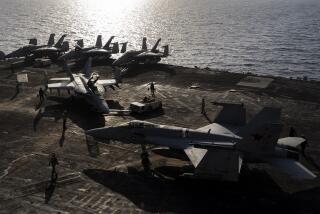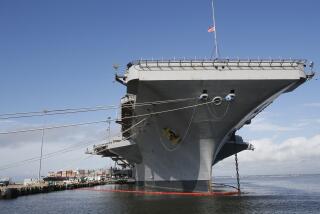Todd Shipyards Loses Navy Contract; Could Cost Jobs at San Pedro
- Share via
Todd Shipyards Corp. failed to win a major shipbuilding contract from the Navy on Tuesday, a loss that could force the New York company to lay off several thousand workers during the next two years at its San Pedro shipyard.
The contract to build the first, or lead, ship in the Navy’s Arleigh Burke destroyer program was awarded to Bath Iron Works, a subsidiary of Congoleum Corp. in Bath, Me. A Navy spokesman said Bath bid $322 million against Todd’s $413.5 million.
The other losing bid was for $344.5 million from Ingalls Shipbuilding in Pascagoula, Miss., a division of Beverly Hills-based Litton Industries. Loss of the contract is a setback for Litton, but, unlike Todd, the conglomerate has several other revenue sources to ease the blow.
The Arleigh Burke destroyer, also designated as DDG-51, is likely to be the Navy’s last major non-nuclear ship program for the rest of the century. Winning a chunk of the $25-billion program, which calls for 29 destroyers to be built through the 1990s, could mean the difference between death and survival for the handful of companies that make up the nation’s depressed shipbuilding industry.
Company’s Future in Doubt
Todd still can compete for contracts to build the remaining 28 ships in the program, but failure to win the lead contract puts the company’s ability to survive in question.
As commercial shipbuilding goes to foreign countries with cheaper labor forces, domestic shipbuilders are relying almost exclusively on military contracts for long-term revenue. Todd is the last major West Coast shipyard building warships.
Todd had no comment Tuesday but said it would make a statement this morning. When the company bid for the Navy job five months ago, however, company Vice President Len M. Thorell said that losing the award could result in thousands of layoffs through 1987 at its San Pedro yard and could seriously hurt the firm’s earnings power.
John Simon, military analyst at Seidler Amdec Securities Inc. of Los Angeles, said Todd can “limp through” on the hope that it soon will win several other contracts in the Navy program, which he said the company is likely to do. Failure to win those contracts, however, could jeopardize the company, which, like other shipbuilders, has been on a “starvation diet” of increasingly meager Navy contracts.
In a thinly veiled acknowledgment that Todd badly needs--and is likely to get--a portion of the Arleigh Burke business, the Navy said last month that many of the program’s vessels would be built on the West Coast.
Open Bidding in 1986
“And when you say West Coast, who else is there but Todd?” Simon said. “They’ll go through a slow period and I’m sure that will mean some layoffs, but sooner or later they’ll get something.”
Todd will have to wait at least 18 months, however. The lead ship awarded Tuesday is scheduled for completion in October, 1989. Contracts to build the second and third ships in the program will be awarded by open bidding in the fall of 1986, and contracts for the next five ships will be awarded in the fall of 1987, the Navy said.
Start-up contracts for defense programs rarely are profitable, yet companies compete fiercely for them because they can help win subsequent, large-scale production contracts that generally have wider profit margins. Unlike in other areas of Pentagon bidding, however, a company that gets a lead Navy contract is not necessarily more likely to get follow-on awards.
For example, analyst Simon said, Bath won the lead contract to build the first of several dozen guided missile frigates, called FFGs, but Todd won subsequent contracts to build 29 of the vessels in its San Pedro and Seattle yards. That frigate program has provided Todd’s West Coast yards with most of their work in recent years.
“In the end, Todd’s built far more (FFGs) than Bath has,” said Simon, adding that he sees a similar scenario for Todd in the Arleigh Burke program.
The Arleigh Burke program will give the Navy a four-engine, two-propeller vessel that can repel air, surface or submarine attacks. The Navy said that none of its current ships have defensive capability on all three fronts.
Todd, which also has shipyards in New Orleans, San Francisco and Galveston, Tex., already has laid off thousand of workers at its San Pedro yard in recent years, sought concessions from its unions and lobbied heavily in Congress and the Administration to cope with dwindling workloads felt industrywide.
In the competition for the destroyer contract, which has been intense and public, Todd bought a series of advertisements accusing the Navy of ignoring a 1956 law that requires the service to support West Coast commercial shipyards at a level “adequate to meet the requirements of national defense.”
Employment at the company’s San Pedro operations declined to 3,400 in October, 1984, from 5,800 in March, 1983, a cutback that included 2,000 layoffs.
More to Read
Inside the business of entertainment
The Wide Shot brings you news, analysis and insights on everything from streaming wars to production — and what it all means for the future.
You may occasionally receive promotional content from the Los Angeles Times.










